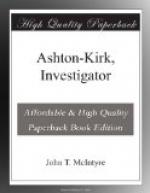“To think,” said he, “how the natures of men differ. Some are like the gods of old, and others again are like—well, like anything you choose to call them. And yet,” with philosophic speculation, “these two widely diversified types are sometimes friends. To the surprise of everyone they occasionally take up with one another. It’s hard to say why, but it is so.”
“I’ve noticed it myself,” said Ashton-Kirk.
Tobin nodded.
“Never,” said he, “did I see it so exemplified as in the case of Richard Morris and this felly who has just been killed. Never were two men more unlike; but sorra such an intimacy did I ever see afore, as there was between them. Morris when he had the drink in him was a poet. His ideas soared to the starry skies; he flew about upon the wings of the wind; faith I believe he thought the sun was not beyond his reach. But Hume was a divil! God save us, that I should say the like about any human creature; but he had the imp in him, for many’s the time I see it grinning and looking out at his two eyes.”
“I’ve heard it said that he was an unpleasant sort of chap,” agreed the other.
“Unpleasant,” said Tobin, “does not do credit to his capabilities, though ’tis a good word enough. There was never a man came into the Coffin Club, during the five years that I were there, that looked as though the place fitted him, but Hume. The others were like bad little boys who wouldn’t take a dare. But Hume was just right. To see him lift one of the stone skulls to his lips and grin over it at you, would make your blood run cold. And bless us and save us, gentlemen, how he would jeer and snarl and laugh all at the one time. Many’s the time I’ve listened to poor Morris rave and paint his pictures of what he was going to do in times to come; and on the other side of the coffin-table, Hume would urge him on, leerin’ and grinnin’ like Satan himself, and making all manner of game of him. Bedad, me gorge rose at it more than once, and it was all I could do to keep from takin’ him by the scruff of the neck and throwin’ him intil the street.”
“Almost every man has some spark of good in his nature, however faint,” said Ashton-Kirk. “And Hume may have had one, too, though no one seems to have discovered it.”
Tobin smiled and returned:
“An Irishman always has a good deal of respect for the fighting strain, no matter if it be in a man, or a beast, or a bird. Old Nick himself must be a grand, two-handed man, and as such we must give him credit. And ’twas the same way with this felly Hume. He had real fighting blood, so he had; and sorra the man ever undertook to impose on him the second time.”
“And as a true Celt, you held this to be a credit mark,” laughed Ashton-Kirk.
“I did. And, indeed, he seemed to consider it so himself, though he was not one to care a snap what others thought of him. But often he’d boast of the stock he came from. Fighters they were to the core, he said, fighters who never knew when they were whipped, and who’d go on fighting while they had a leg to stand on, an eye to see, and an arm to strike a blow.”




